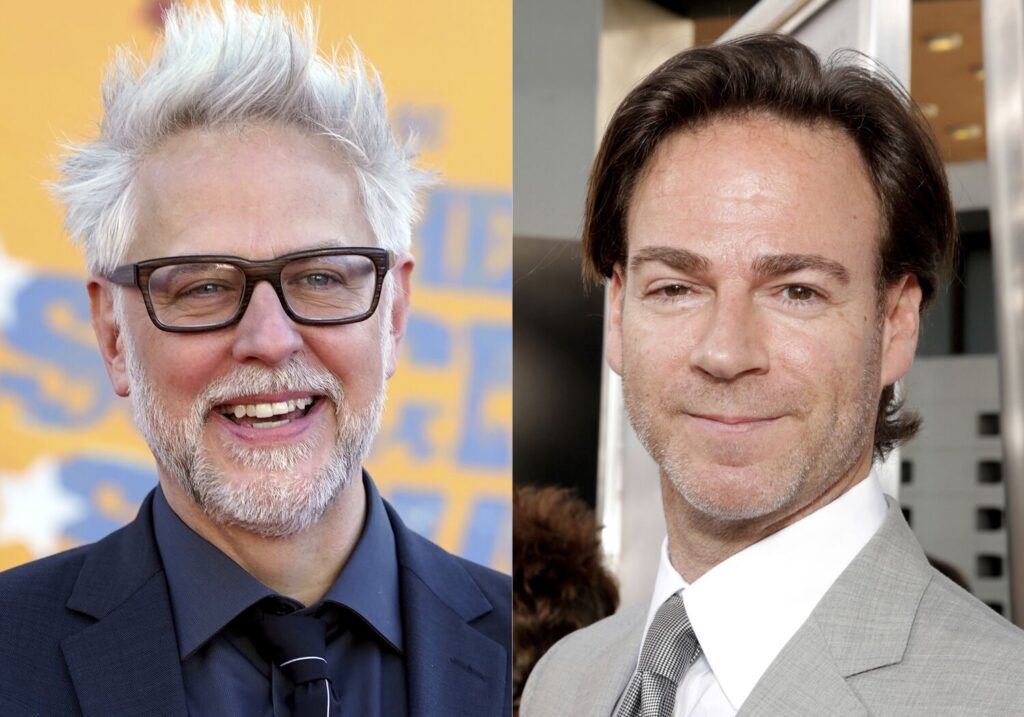Warner Bros. Discovery has found its leaders for the DC film and television universe.
The company on Tuesday named filmmaker James Gunn and producer Peter Safran as co-chairmen and chief executive officers of DC Studios, where they will oversee the creative direction of the superhero franchise productions in film, television and animation.
Newsletter
Inside the business of entertainment
The Wide Shot brings you news, analysis and insights on everything from streaming wars to production — and what it all means for the future.
You may occasionally receive promotional content from the Los Angeles Times.
They will report directly to Warner Bros. Discovery CEO David Zaslav, who has promised investors a 10-year plan modeled on Walt Disney Co.’s successful Marvel Studios strategy.
Gunn and Safran both have experience with DC material.
Gunn directed 2021’s DC feature “The Suicide Squad,” the irreverent R-rated film about a special team of villains working for a shadowy government agency. He also created the HBO Max spinoff series “Peacemaker,” based on a character from “The Suicide Squad.”
In an unusual situation, Gunn has also directed movies for rival Marvel, the highly successful “Guardians of the Galaxy” films. Just Tuesday, Gunn released a trailer for a “Guardians of the Galaxy” holiday special produced for Disney+.
Safran was a producer on Warner Bros. and New Line’s “Conjuring” movies, plus DC installments including “Aquaman,” “Shazam!” and “The Suicide Squad.” Before launching his production company, the Safran Co., he was president of Brillstein-Grey Management, home of many A-list clients.
The duo will work alongside Michael De Luca and Pamela Abdy, who in June were named co-chairpersons and CEOs of Warner Bros. Film Group, overseeing non-superhero live action movies. They were also tasked with managing the DC slate until Zaslav found someone to run the franchise.
DC boasts some of the best-known superheroes — Superman, Batman, Wonder Woman — but has not always lived up to its potential, playing an underdog to Disney and Marvel during the last decade.
The most recent release, the $195-million “Black Adam,” starring Dwayne Johnson as the titular antihero, opened with a solid $67 million in box office from the U.S. and Canada last weekend and heralded the return of Henry Cavill to the role of Superman.
The announcement ends speculation over who would replace Walter Hamada, who previously shepherded superhero films for the Burbank studio under what was then called DC Films.
The company was in discussions with Dan Lin, known for producing on Warner Bros.’ “Lego” and “It” movies, but talks fell apart. Running DC will bring a monumental task and constant comparisons with the success rate of Marvel President Kevin Feige, the result of a uniquely thorough understanding of the comic book source material.
During the last several years, DC produced hits including “Aquaman,” “Shazam,” “Joker” and “The Batman.” “Birds of Prey” disappointed at the box office, and “The Suicide Squad” and “Wonder Woman 1984″ were hobbled by being simultaneously released on HBO Max.
But the questions about DC are not necessarily all about recent performance. They’re about the strategy for the next few years.
In an attempt to catch up with Feige at Marvel and Disney, DC tried to build an extended universe too quickly, betting on the vision of Zack Snyder after 2013’s “Man of Steel.” But poor creative decisions and second-guessing got in the way, and “Justice League,” which was supposed to be DC’s “Avengers,” performed poorly at the box office and was ripped apart by fans.
Warner Bros. then backed away from some of the universe-building in an attempt to focus on making individual hit movies based on the I.P. The result is that there are now multiple disparate timelines for the DC movies and television shows, including Matt Reeves’ “The Batman” with Robert Pattinson in a noir take on the Caped Crusader. One of the challenges will be to figure out which storylines to bring together and how to do so.
“There’s a lot of risk-taking being done that maybe DC hasn’t gotten full credit for, but there are also movies that still exemplify why there isn’t a cohesive vision,” Shawn Robbins, chief analyst at Box Office Pro, told the Times last week. “It’s fascinating to see how these different universes live inside of the broad DC spectrum.”
DC is a key property for Warner Bros. Discovery, which wants to maximize box office returns while also boosting subscribers for HBO Max, all the while trying to be financially responsible. The company shelved a nearly completed DC movie, “Batgirl,” after determining that it was too expensive for streaming but not epic enough for theaters.

